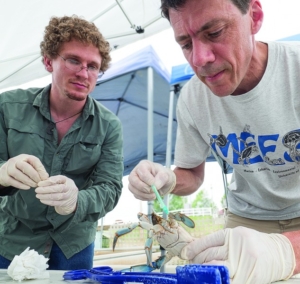
UMCES’ Eric Schott, right, and his graduate student, Matt Spitznagel, take a blood sample from a crab at Phillips Wharf Environmental Center.
Eric Schott, a molecular biologist with the University of Maryland Center for Environmental Science (UMCES) is investigating a virus that is plaguing blue crab shedding operations around the Bay. Schott first discovered the virus, called CsRV1, 10 years ago and it has been found to be present in up to 80% of the crabs that die in shedding operations. The goal of his research is to determine if they can identify which crabs will succumb to the virus and if genetics play a role in susceptibility. Jeff Shields of VIMS, who is collaborating with Schott, believes that bacteria play a role providing a 1 – 2 punch that kills the molting crabs.
Schott’s work has already provided insights that is helping to reduce crab mortality. He recommends that shedding operations use water from the open Bay which has more dissolved oxygen and lower nitrogen concentrations than what is typically found in water in the creeks and coves where these businesses are typically located. He also suggests only introducing crabs into the shedding tanks that are a few days from shedding as apposed to a week from shedding to reduce time in the tank.
You can read more about it here.
